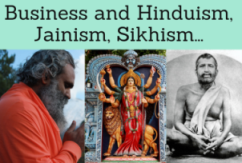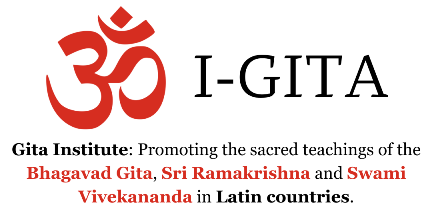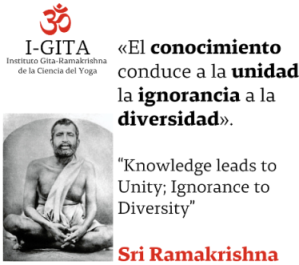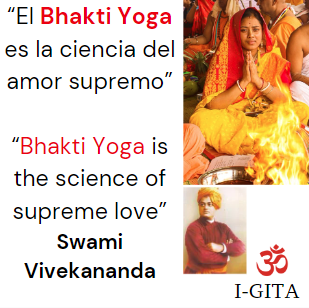Sri Ramakrishna (Harmony of Religions) Hinduism
Swami Vivekananda. Harmony of Religions (Sri Ramakrishna, Hinduism) Ethics

Sri Ramakrishna Paramahansa (Gadadhar Chattopadhyay, 1836 - 1886) is one of the most influential spiritual leaders of Humanity in recent centuries. His message of peace (Ahimsa) and especially that all religions are valid (Principle of Harmony of Religions); they are different paths to God are laying the foundations for a new global ethics.

The important message of Sri Ramakrishna Paramahansa about Harmony of Religions and tolerance that derives from it, should be a fundamental component of a global ethic.
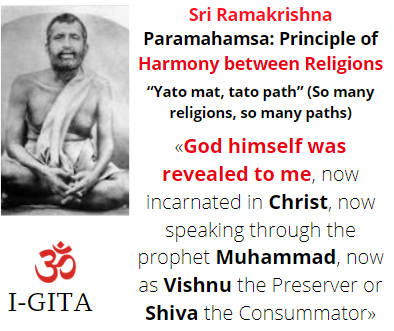
The great British historian Arnold Toynbee, one of the pioneers in the West to understand this vision of Sri Ramakrishna, wrote:
“The principle of Non-Violence of Mahatma Gandhi and Sri Ramakrishna's testimony to Harmony of Religions: here we have the approach and spirit that can make it possible for the human race to grow together into one family.”
- Ethical Renewal of Hinduism
- Sri Ramakrishna Paramahansa: The Prophet of “Harmony of Religions”
- Swami Vivekananda
- Mahatma Gandhi
Hinduism: Sri Ramakrishna Paramahansa, Swami Vivekananda
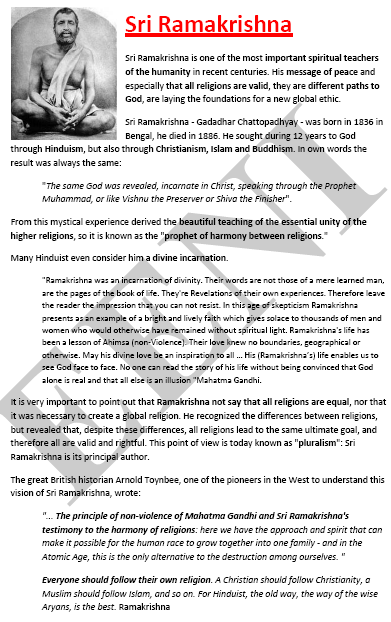


Religions and Global Business -
Religious diversity

The Subject “Sri Ramakrishna Paramahansa (Hinduism, India)” is included within the curriculum of the following academic programs at EENI Global Business School:
Doctorate: Ethics, Religion & Business.

Master: Religions & Business

Bhagavad Gita Courses, Realization of the Gita
Languages:  or
or  Sri Ramakrishna
Sri Ramakrishna  Sri Ramakrishna
Sri Ramakrishna  Sri Ramakrishna.
Sri Ramakrishna.

In the 19th century, under the full British domination, several spiritual wises started a profound renewal of Hinduism in India, complaining even of some of their traditional values, e.g., abolishing caste system and ultimately converting Hinduism into a religion with a strong ethical pillars (Hindu Civilization).
Three figures are fundamental in this renewal:
It is crucial to point out that Ramakrishna not said that all religions are equal, nor that it was necessary to create a global religion.
He recognized differences between religions but revealed that, despite these differences, all religions lead to the same ultimate goal, and therefore all are valid and rightful. This point of view is today known as “pluralism”: Sri Ramakrishna is its principal author.
He sought during twelve years to God through Hinduism, but also through Christianity and Islam. In his words, the result was always the same:
“The same God was revealed, incarnated in Christ, speaking through the Prophet Muhammad, or like Vishnu the Preserver or Shiva the Finisher.”
From this mystical experience, derived the beautiful teaching of the essential unity of higher religions, so it is known as the “prophet of harmony between religions.”
“God has made different religions to suit different
aspirations, times, and countries. All doctrines are only so many paths, but a path is by no means God Himself.
The same single material, water, has different names for different peoples, one calls water, another eau, a third aqua, and another pani, in the same way, that the Evergreen- Intelligent-Bliss is invoked by some as God, by others as Allah, by others, Hari (Lord), and by others,
Brahman.
Take a bow and worship where others kneel, for which so many have paid a tribute of veneration, the good Lord should, as it is all compassion.
The Savior is the messenger of God. So whenever there is any waning of religion in any part of the World, God sends His Savior there. It is one and the same Savior that, having plunged into the ocean of life, rises up in one place and is known as Sri Krishna, and diving again rises in another place and is known as Christ.
Everyone should follow his religion. A Christian should follow Christianity; a Muslim should follow Islam, and so on. For Hinduism, the old way, the way of the Aryan wises is the best.”
Many Hindus even consider him a divine incarnation. For Mahatma Gandhi:
“Ramakrishna was an incarnation of divinity. Their words are not those of a merely learned man, are the pages of the book of life. They are Revelations of their experiences. Ramakrishna's life has been a lesson of Ahimsa (Non-Violence). Their love knew no boundaries, geographical or otherwise. May his divine love be an inspiration to all.”
Swami Vivekananda (1863 - 1902), was a monk (Hinduism) and the major disciple of Sri Ramakrishna. He was a key figure in the introduction of Indian philosophies of Vedanta and Yoga in Western, revival of Hinduism in India as well as in development of the idea of nationalism in colonial India. Vivekananda founded the Ramakrishna Math and Ramakrishna Mission.
In the first Parliament of World's Religions (Chicago 1893), Swami Vivekananda gave a speech still remembered today and considered essential in dialogue between religions:
“I am a Hindu. And I feel fine. Christian should be a good Christian. Muslim a good Muslim. Hinduism cannot live without Buddhism, and Hinduism not exists without Buddhism.”
Ahmadou Hampaté Bá (Muslim, Mali) is an excellent example of the Sri Ramakrishna principle.
Sample: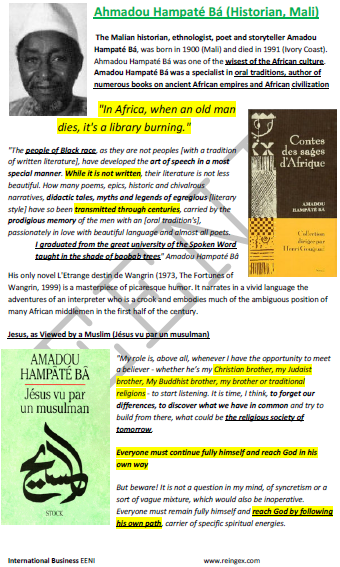
(c) EENI Global Business School (1995-2025)
Top of this page









 WhatsApp
WhatsApp
